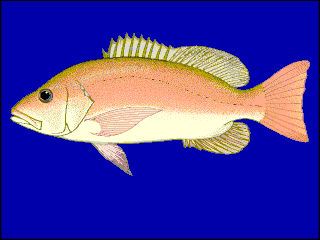 W
WThe African red snapper, Lutjanus agennes, is a species of snapper native to the coastal Atlantic waters of Africa from Senegal to Angola. They inhabit coral reefs and areas with rocky substrates and are also known to enter brackish waters of lagoons and rivers. This species can reach 139 cm (55 in) in total length, though most only reach 50 cm (20 in). The greatest recorded weight for this species is 60 kg (130 lb). It is of minor importance to local commercial fisheries, but is sought-after as a game fish.
 W
WThe African redfinned barb is a species of ray-finned fish in the genus Enteromius. It is found from the Niger Delta to the Congo Basin.
 W
WAlburnoides eichwaldii, also known as the South Caspian sprilin or Kura chub, is a fish species in the family Cyprinidae. It is widespread in the Western Asia in the river drainages of the southwestern Caspian coast from Samur down to rivers of the Lenkoran Province in Azerbaijan. It prefers streams and rivers in the foothills, with well oxygenated, fast-flowing waters, and spawns on gravel in swift currents.
 W
WThe bleeding shiner is a freshwater ray-finned minnow in the family Cyprinidae, which includes carps and minnows. It occurs in tributaries of Ozark-draining tributaries of the Missouri, and Mississippi rivers in southern Missouri and northeastern Arkansas. Its preferred habitat is rocky and sandy pools and runs of headwaters, creeks and small rivers.
 W
WThe brown smooth-hound is a houndshark of the family Triakidae. It is found on the continental shelves of the subtropical eastern Pacific, from northern California to the Gulf of California, as well as Ecuador and Peru between latitudes 43° N and 18° S, from the surface to a depth of 200 m. It can grow up to a length of 1 m. The reproduction of this shark is viviparous.
 W
WGarra ceylonensis is a species of ray-finned fish in the cyprinid family. It is endemic to rivers and streams in Sri Lanka. - considered as a schooling fish(formerly known as "Ceylon").
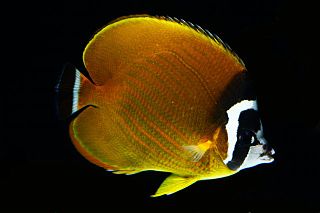 W
WChaetodon wiebeli, commonly known as the Hong Kong or blackcap butterflyfish, is a fish native to the Western Pacific Ocean.
 W
WThe chestnut goby is a species of goby found in the Mediterranean and Black Sea. In the Black Sea it is found in the Gulf of Varna, saline lagoons near Abrau, also near Novorossiysk and Sochi. This species occurs in shallow, coastal waters. It can reach a length of 6.6 centimetres (2.6 in) SL.
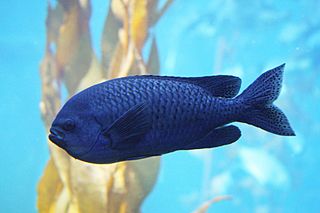 W
WThe blacksmith, also known as the blacksmith chromis and blacksmith damselfish, is a fish in the damselfish family. It is native to the northeastern Pacific Ocean, where it range is from Monterey Bay, California, USA, to central Baja California, Mexico. This small fish is associated with rocky reefs and kelp forests.
 W
WCoryphopterus glaucofraenum, the bridled goby, is a species of goby native to the Western Atlantic Ocean and the Caribbean Sea from North Carolina to Brazil. It can be found on reefs at depths of from 2 to 45 metres in areas of white sand. This species can reach a length of 8 centimetres (3.1 in) TL. It occasionally makes its way into the aquarium trade.
 W
WCrenicara punctulatum, the checkerboard cichlid, is a species of cichlid fish native to creeks and rivers in the Amazon and Essequibo basins in South America.
 W
WCrenuchus spilurus, the sailfin tetra, is a species belonging to the South American darter family, Crenuchidae. It is found in the Amazon and Orinoco Basins, as well as various river Basins in the Guianas. It is the only member of its genus.
 W
WDalophis cephalopeltis is an eel in the family Ophichthidae first described by Peiter Bleeker in 1863. It is a tropical, marine eel which is known to inhabit the Eastern Atlantic near the coast of western Africa. It lives in estuaries and rivers, and forms burrows in sand or mud. Males have been recorded to reach a maximum total length of 53.5 centimetres.
 W
WThe eastern sand darter is a species of freshwater ray-finned fish, a darter from the subfamily Etheostomatinae, part of the family Percidae, which also contains the perches, ruffes and pikeperches. The eastern sand darter is a relatively small fish, most plentiful in the Mississippi and Ohio Rivers, as well as Lake Champlain and the Great Lakes. It prefers sandy-bottomed streams and sandy shoals in the lakes. The eastern sand darter feeds on larvae of black flies and other small insects in the water. They also feed on zooplankton in small portions since their small mouth size limits their gape ability. Its average body size is around 1.5-2 in long, and it breeds in the spring and summer in sandy-bottomed waters.
 W
WEnteromius ablabes is a species of ray-finned fish in the genus Enteromius. It occurs in West Africa from the Sahel to the coast between Guinea and Nigeria, south to the central Congo Basin.
 W
WEnteromius trispilos is a species of ray-finned fish in the genus Enteromius that lives in West Africa.
 W
WEpinephelus analogus, the spotted grouper, spotted cabrilla or rock bass, is a species of marine ray-finned fish, a grouper from the subfamily Epinephelinae which is part of the family Serranidae, which also includes the anthias and sea basses. It is found in the eastern Pacific Ocean where it is associated with reefs.
 W
WThe estuary perch is a species of temperate perch endemic to south-eastern Australia, where it prefers brackish waters such as lower tidal reaches of coastal lakes, rivers, and streams.
 W
WHelogenes marmoratus is a species of whale catfish occurs in Brazil, Ecuador, French Guiana, Guyana, Peru, Suriname and Venezuela. It is found in the Atlantic drainages of the Guianas, the upper Orinoco and Rio Negro systems, and the upper Amazon River basin. This species grows to a length of 7.3 cm.
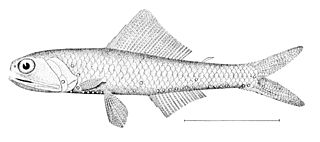 W
WNotoscopelus caudispinosus is a species of lanternfish in the family Myctophidae. It is found in the eastern and western Atlantic Ocean, the Indian Ocean and parts of the Pacific Ocean. It spends the day below 1,000 m (3,300 ft), rising towards the surface to feed at night.
 W
WPebbled butterflyfish are marine, perciform fish often found near reefs. They are at most 12 centimetres (4.7 in) in length, and white with yellow, brown, and black markings. These butterflyfish are territorial and form pairs. The pebbled butterflyfish occur near reefs in the eastern central Pacific, and are endemic to waters off the Hawaiian Islands and Johnston Atoll. They have a role in aquarium trade.
 W
WPoecilia mexicana, commonly known as the shortfin molly or Atlantic molly, is a species of poeciliid fish native to fresh and brackish water in Mexico and Guatemala. One population is found in caves and known as the cave molly.
 W
WThe redside barb or two-spot barb is a species of ray-finned fish in the genus Puntius. It is found in India and Sri Lanka. It was identified and classified by Pieter Bleeker in 1863.
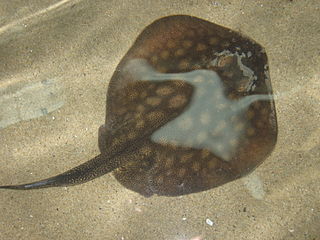 W
WThe round stingray or Haller's round ray and Little round stingray is a species of round ray, family Urotrygonidae, found in the coastal waters of the eastern Pacific Ocean. It is a small, common ray that feeds mostly on benthic invertebrates. On the beaches of southern California, it is responsible for numerous injuries to bathers, who are stung when they accidentally step on the fish. The wound caused by its venomous spine can be painful, but is non-fatal.
 W
WSabanejewia aurata is a species of ray-finned fish in the family Cobitidae. It is found in Afghanistan, Armenia, Azerbaijan, Bulgaria, Croatia, Georgia, Hungary, Iran, Romania, Russia, Ukraine, and Uzbekistan.
 W
WSelene brevoortii, the hairfin look down, also known as the airfin lookdown, Mexican lookdown or Pacific lookdown, is a species of carangid fish native to warmer parts of the East Pacific where it is found from southernmost California, United States to northern Peru. This species is generally found close to the coast at depths of less than 50 m (160 ft). They grow to 38 cm (15 in) in fork length. It is of minor importance to local commercial fisheries, but is popular as a gamefish. Its specific name honours the American book collector, numismatist, amateur naturalist and friend of Theodore N. Gills J. Carson Brevoort (1817-1887) for his interest in the fishes of the family Carangidae.
 W
WThe southern bastard codling or bearded red cod is a morid cod of the genus Pseudophycis, found around southern Australia including Tasmania, and New Zealand, from the surface to 300 m. Its length is up to 63 cm.
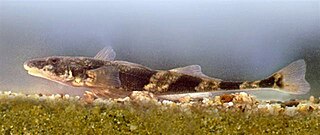 W
WThe streber, also known as the Danube streber, is a species of freshwater ray-finned fish in the family Percidae. It is found in strongly flowing waters in the Danube and Dniester drainages of Austria, Bosnia and Herzegovina, Bulgaria, Croatia, the Czech Republic, Germany, Greece, Hungary, Italy, Moldova, Serbia, Slovakia, Slovenia, Switzerland, and Ukraine.
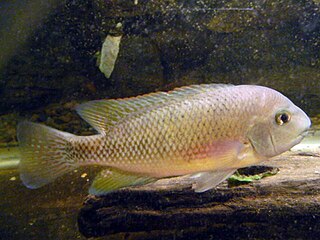 W
WTalamancaheros sieboldii, the Siebold's cichlid, is a species of cichlid fish found in fast- and moderately-flowing rivers on the Pacific slope of western Panama. The population in Costa Rica, which formerly was included in this species, is now recognized as T. underwoodi. T. sieboldii reaches up to 25 cm (10 in) in standard length and eats vegetable matter and detritus.
 W
WThe gafftopsail pompano is a species of jack in the family Carangidae. It is found in the eastern Pacific.
 W
WThe tropical gar is a species of fish from Central America, where it is found in the Pacific and Atlantic drainages from southern Mexico to Costa Rica. In Mexico it is known as pejelagarto, a contraction of the words "pez" (fish) and "lagarto" (alligator). This gar inhabits a wide range of fresh and brackish water habitats such as rivers, floodplains, lakes and pools, but avoids areas with a strong current. It reaches lengths of up to 1.25 m (4 ft) and a weight up to 2.9 kg (6.4 lb). The tropical gar looks very similar to the longnose gar in color and markings, but can be distinguished by its shorter, broader snout. The tropical gar's diet consists mainly of cichlids and other fish.